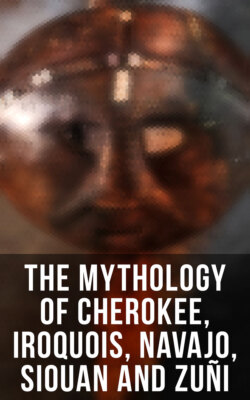Читать книгу The Mythology of Cherokee, Iroquois, Navajo, Siouan and Zuñi - James Mooney - Страница 134
На сайте Литреса книга снята с продажи.
Otter-Heart
ОглавлениеIn the heart of a great forest lay a nameless little lake, and by its side dwelt two children. Wicked magicians had slain their parents while they were yet of tender years, and the little orphans were obliged to fend for themselves. The younger of the two, a boy, learned to shoot with bow and arrow, and he soon acquired such skill that he rarely returned from a hunting expedition without a specimen of his prowess in the shape of a bird or a hare, which his elder sister would dress and cook.
When the boy grew older he naturally felt the need of some companionship other than that of his sister. During his long, solitary journeys in search of food he thought a good deal about the great world outside the barrier of the still, silent forest. He longed for the sound of human voices to replace the murmuring of the trees and the cries of the birds.
"Are there no Indians but ourselves in the whole world?" he would ask wistfully.
"I do not know," his sister invariably replied. Busying herself cheerfully about her household tasks, she knew nothing of the strange thoughts that were stirring in the mind of her brother.
But one day he returned from the chase in so discontented a mood that his unrest could no longer pass unnoticed. In response to solicitous inquiries from his sister, he said abruptly:
"Make me ten pairs of moccasins. To-morrow I am going to travel into the great world."
The girl was much disturbed by this communication, but like a good Indian maiden she did as he requested her and kept a respectful silence.
Early on the following morning the youth, whose name was Otter-heart, set out on his quest. He soon came to a clearing in the forest, but to his disappointment he found that the tree-stumps were old and rotten.
"It is a long, long time," he said mournfully, "since there were Indians here."
In order that he might find his way back, he suspended a pair of moccasins from the branch of a tree, and continued his journey. Other clearings he reached in due time, each showing traces of a more recent occupation than the last, but still it seemed to him that a long time must have elapsed since the trees were cut down, so he hung up a pair of moccasins at each stage of his journey, and pursued his course in search of human beings.
At last he saw before him an Indian village, which he approached with mingled feelings of pleasure and trepidation, natural enough when it is remembered that since his early childhood he had spoken to no one but his sister.
